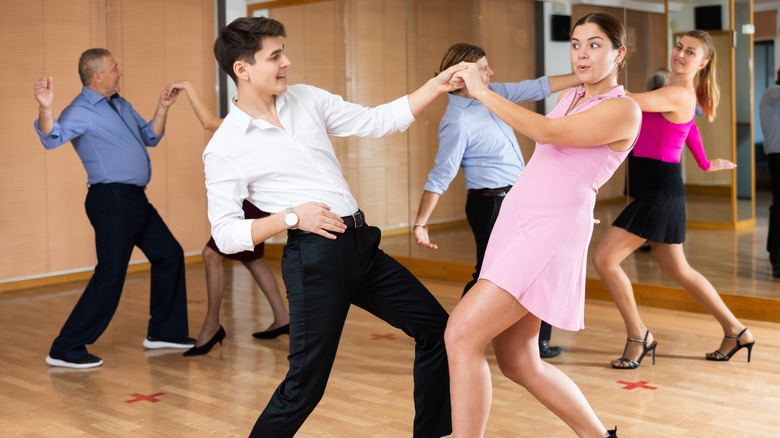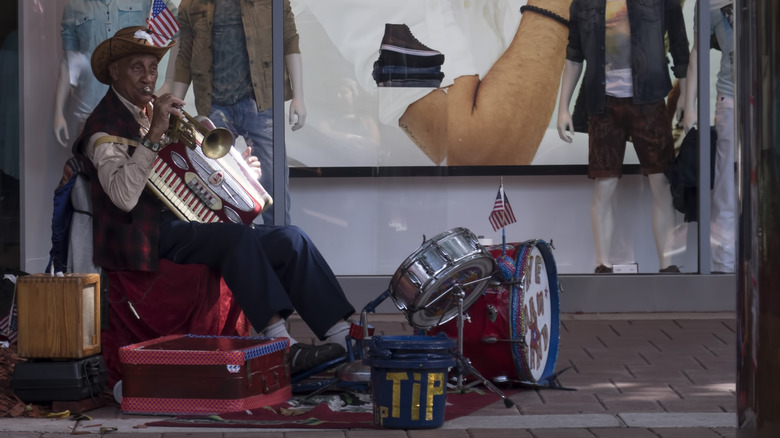The Bizarre Thing That's Illegal For Performers To Do In Miami, Florida
It's once again time to dip our toes in the salty surf of a sunshiney state replete with absurd (and sometimes true) stereotypes: Florida. Ready for a huge, heapin' helpin' of elderly, track-suited and shambling retirees served alongside your hit of long-bygone Disney magic? How 'bout them Everglade gators waitin' to nab an Insta-hopeful snack posing along the bulwark of a rented hovercraft? Or worst or all, the opioids — a grim fact, indeed. There should be, we don't know, maybe some laws down there. Like the useful kind. Not the useless kind that prevents entertainers from mingling with guests. Because Miami? It's got a weird law against precisely that.
Wait, back up, you say. What could be the harm of performers at a venue or event hall hanging around with non-performers? "Mingling," as Miami Code of Ordinances says in Section 5-45, or "fraternizing." How about cavorting, then? Sashaying, maybe, along the outskirts of a crowd? Or weaving through its collective mass while giving friendly nods?
We have really have no clue if any of those actions are legal, because Section 5-45 is as vague in its specifics as it specific in its two banned actions: "It shall be unlawful for employees or entertainers in dance halls or ballrooms to mingle or fraternize with the customers or patrons of such establishments, except when actually providing dance instruction to such customers or patrons." The reader will note, however, that this law seemingly only applies to the two locations mentioned: dance halls and ballrooms.
No fraternizing in the ballroom, please
If the terms "dance hall" and "ballroom" give you pause, that's because they're as antiquated as Section 5-45 of the Miami County Code of Ordinances. Dating to 1967 and updated in 1980, the law comes across as weird in part because some people probably don't even know what dance halls or ballrooms are. Is a dance hall like a club or something? Do they play Nelly? And aren't ballrooms things frequented only by the elderly and/or college students needing a physical education credit? We can only assume that the law in question was drafted when such venues were all the rage, as it doesn't clearly outline what constitutes a dancehall or ballroom.
This leads us to the "employees or entertainers" in the ordinance. Ultimately, the law bans friendly interactions between customers and employers or entertainers unless dance classes are underway. This implies: 1) Entertainers are people who give dance lessons as well as entertain; 2) There is a non-entertainer employee that also gives dance classes; and 3) Dance halls and ballrooms are places where customers can receive dance classes. The reader should be able to see at this point why the law is as strangely specific as it is vague.
Taken all in all, there could be both ethical and business-related reasons for this law. Maybe it was considered improper in the '60s for employees to interact outside of classes because it could be seen as flirty or unduly influencing customer impressions of business practices. Maybe the law arose in response to the immense social and moral revolution of the 1960s. Who knows.
Moral purity in the ballroom, please
If you're an entertainer who falls outside of the neatly prescribed box of the Miami Code of Ordinances, Section 5-45, you're in luck: Mingle and fraternize away. Or consort or schmooze or gab. This is true whether you're a busker on the street, a juggler on the pier, a yoga teacher on a patch of grass, an unwashed guitarist on the beach, or whatever else. Do as you like so long as you're outside of a ballroom or dance hall.
But within the confines of a ballroom or dance hall, Miami's anti-mingling law is just one precept amongst many. The entirety of Chapter 5, Article II of the Miami Code of Ordinances is devoted to regulating what behaviors are allowed in these areas. There are some ordinances about obtaining licenses and permits, which (very tellingly) may be revoked "for disorderly or immoral conduct" or because the location was "frequented by disorderly or immoral persons." In keeping with our theme of moral purity, police can stop by to have a look any time they want, and windows must be perfectly clean and transparent. Venues also must be closed by midnight on weekdays and 9 p.m. on Sundays.
And in keeping with our no mingling motif, Article II says that customers can't buy drinks for employees. Employees also can't "sell time" to customers in any other way than the prescribed dance instruction. And finally, there's a mandate that still makes sense today: No selling alcohol to minors.


